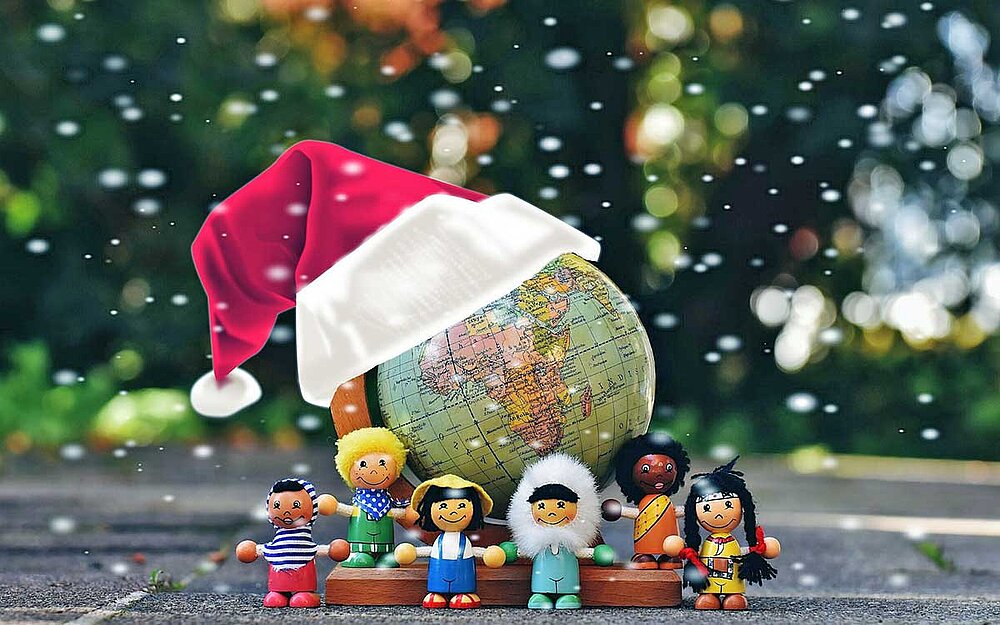Merry Christmas, Feliz Navidad and Buon Natale!

Bewitched brooms, goats going from door to door, Christmas presents on January 6th or a pickle on the Christmas tree. Christmas is more diverse than you think.
Cultural diversity - in the daily work at globegarden this is far more than just a catchword. We see it as a great enrichment to welcome children from different nations and thus make an important and positive contribution to their value orientation towards more esteem, tolerance and respect for all people. Even with the youngest children, we therefore promote understanding among each other and, with our “Discover the World” curriculum, awaken the natural curiosity of children and the joy of discovering the world with all its exciting stories and differences.
Experience: Diversity is an Enrichment
Traditions and customs always play a central role - especially now during the Christmas season. Our caregivers encourage the children to talk about the special features in their families. This not only makes the little ones proud, but also ensures that each and every individual in the group feels comfortable and accepted. However, it is always important to us at globegarden that the respective religious affiliation is not judged and that the teaching of faith is left to the home. But maybe you as a parent would like to learn a little more about unusual Christmas traditions in different countries? Then we have a small selection at a glance for you:
Christmas around the world
Norway - quite bewitched!
In order to spend undisturbed holidays, the Norwegians have to lock up all the brooms. Because they believe that at Christmas witches and ghosts come out of their hiding places to steal the brooms, fly on them through the streets, spread chaos and then throw the sweepers in the morning on the roofs of the neighbors, where they must be laboriously brought down again.
Romania - musical visits with goat
The “Colindători”, similar to the carol singers, go from house to house at Christmas in traditional dress, reciting songs and poems and delivering messages of congratulations. As a reward, the children receive sweets, fruit and sometimes a little money. The singing groups are accompanied by a “capra”, a person dressed up as a goat, who plays all kinds of jokes.
Italy - gifts with delay
According to a legend, the good witch Befana wanted to bring gifts and presents to the baby Jesus just in time for his birth. Unfortunately, she missed the Christmas star and did not arrive on time. That’s why Befana still gives children in Italy their presents on January 5th and 6th - provided they haven’t been naughty. Otherwise they receive only pieces of coal and ashes.
USA - sour makes merry!
A cucumber on the Christmas tree? Wonderful! Because whoever discovers the vegetable (made of glass) first in the greenery of the fir tree can look forward to an extra gift. The finder can look forward to a reward. According to legend, the tradition of the so-called Christmas Pickle began in the early 20th century. At that time, there was often not enough money to buy each child a gift. Often, only the child who was the first to discover the green Christmas cucumber received a gift.
The Netherlands - earlier than everyone else
By the time we sit under the Christmas tree, the big fun is already over for children in the Netherlands. Because there, Sinterklaas and his helper Zwarte Piet arrive by ship in the harbors as early as December 5th and distribute the presents. The day is celebrated in the circle of the family with a cheerful dinner. On Christmas Eve, most Dutch people traditionally go to church and then enjoy an extensive feast.
Poland - guests welcome!
The more the merrier! In Poland, the extended family comes together at Christmas to celebrate, dance and sing together. Dinner is always served after the first star has risen in the sky. And in case an unexpected guest shows up, there is always one more place setting than needed. In addition, there is a wafer for everyone, which is printed with a (holy) picture. This is broken into small pieces and shared with the other guests. Thereby one wishes each other good luck for the next year.
Sweden - a guest in Duckburg!
Christmas without Donald Duck? Unimaginable for Swedes! The comic series has been running for decades in the afternoon before the traditional “Julbord”. After Christmas dinner, the presents are unwrapped under the Christmas tree. And on the morning of December 25th, it’s off to church for early Mass at 6 or 7 a.m. - assuming you’re already awake.
Spain - Lotto and little tall tales
The festive season begins in Spain with the greatest excitement: On December 22nd, the prizes of the Christmas lottery are drawn live on television and millions of people hope for the main prize “El Gordo”, in which record sums are regularly distributed. Christmas Eve and the two Christmas holidays (“Navidad”) are then all about family. Instead of gathering around the Christmas tree, everyone gathers around the manger, which grows a little each year. But on December 28th, the “Feast of the Innocent Children,” it’s all about tricking your loved ones with made-up or falsified stories. The most bizarre “fake news” possible then also circulates in the newspapers and on TV. As in Italy, children receive their gifts - placed on their doorstep by the Magi - only on January 6th in exchange for water and bread.
Australia - singing under a scorching sun
While it’s freezing cold in this country, people on the other side of the globe are celebrating Christmas at a summery 30 degrees in the shade. Nevertheless, the streets and front yards are festively decorated and in many cities people meet in public parks or on the beach for “Carols by Candlelight”, where Christmas carols are sung by candlelight. On December 25th, Santa Claus brings presents to children - in shorts and a T-shirt instead of a fur coat.
More ideas that connect us
- Even outside of the Christmas season, there are many opportunities to teach the children an appreciative approach to other cultures....
- Our caregivers tell the children fairy tales and stories from other countries. In our library you will also find many books on this subject, which you are welcome to borrow at any time.
- Visits to intercultural theater plays are very popular with young and old.
- Music connects: There is a huge selection of international children’s songs. Learning them is fun and opens your own horizons.
- Each culture has its own cuisine - cooking together or specialty weeks for lunch together create a sense of solidarity.
- At birthdays and celebrations, everyone brings a specialty from their country of origin. The result is a colorful buffet, and people can easily get into conversation.
- On a world map, the children can mark where their family of origin and the families of their friends come from.

